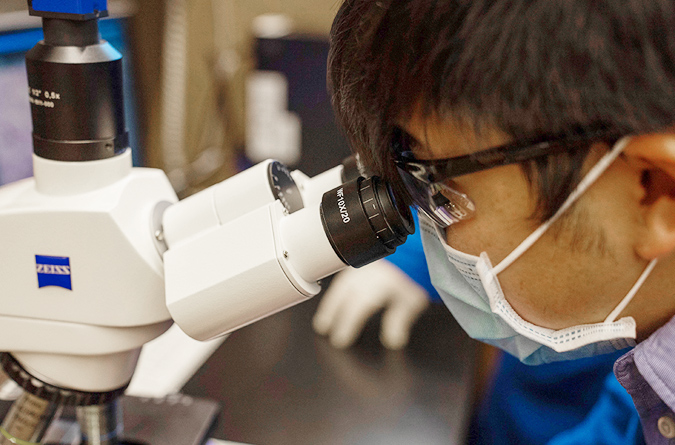Prion Diseases
Our infectious disease experts provide education and tips for preventing these rare neurodegenerative diseases. If you or your loved one receives a diagnosis, we are here to support you in every way possible.
Medically reviewed by Scott Crabtree, M.D. on Oct. 18, 2023.

Exceptional Expertise for Uncommon Infectious Diseases
At UC Davis Health, we’re committed to furthering prion disease research, education and prevention. Our infectious disease experts can help you understand your risk level and provide advice on how to stay safe. If you’re ever concerned about symptoms, we’re available to provide the clinical assessment and answers you need.
Our Difference
Comprehensive Infectious Disease Program
UC Davis Health has a longstanding tradition of excellence for infectious disease research and education. We stay at the forefront of common and rare illnesses, such as prion diseases, so that you can stay safe.
Care for the Community
We’re proud to work closely with community members and organizations to prevent the spread of diseases. Our infectious disease clinics connect people to the information, testing and treatment they need.
Shaping the Future of Infectious Disease Care
As a nationally recognized academic medical center, our infectious disease fellowship program trains doctors in a wide range of diseases. Our doctors have specialized expertise in all fungal, parasitic, bacterial and zoonotic diseases.
What Are Prion Diseases?
Prion diseases are rare, usually fatal, neurogenerative diseases. These illnesses destroy nerve cells in the brain and decrease brain function.
They result from misfolded proteins, called prions, that cause widespread cell damage. Prion diseases are also called transmissible spongiform encephalopathies (TSEs).
Prion diseases affect humans and animals (sheep, cattle and deer). Some prion diseases are inherited (passed down through families). Others happen sporadically, without any known cause. Rarely, people can get prion diseases from infected animals or other humans.
Prion diseases cause severe symptoms such as:
- Memory loss
- Dementia
- Hallucinations
- Diminished mobility
- Personality changes
- Impaired thought and speech
- Coma
There is no cure or treatment for prion diseases. Most people with these diseases die within a few years after symptoms develop, sometimes sooner.
While medication will not slow disease progression, supportive care can help people stay comfortable. Our specialists are here to support you and your loved ones throughout prion disease diagnosis and care.
Types of Prion Diseases in Humans
There are several types of prion diseases in humans, all of which are rare. These diseases are not contagious like a cold or a flu, but they can spread between organisms. To get prion disease, you would need to come into direct contact with brain tissue from an infected human or animal.
Prion diseases in humans include:
Creutzfeldt-Jakob Disease (CJD)
CJD typically affects people over the age of 60. It is the most common type of prion disease in humans. There are about 350 cases of CJD in the U.S. annually. There is a small chance of transmission if you directly handle infected brain tissue, such as during surgery or an autopsy.
Variant Creutzfeldt-Jakob Disease (vCJD)
Variant Creutzfeldt-Jakob disease is a rare subtype of CJD. Humans can develop it by eating beef from cows infected with bovine spongiform encephalopathy (BSE), also known as "mad cow disease". The same prions that cause BSE in cows can lead to vCJD in humans.
Gerstmann-Straussler-Scheinker Syndrome (GSS)
GSS is an inherited brain disease that typically affects people between the ages of 35 and 55. It progresses slowly, but symptoms may not appear until late in the disease. Death usually occurs within 2 to 10 years.
Fatal Familial Insomnia (FFI)
FFI is a genetic disease that affects your thalamus. This part of your brain processes sensory information and regulates sleep-wake cycles and cognition (thinking). Symptoms usually begin in adulthood. FFI can cause severe insomnia, hallucinations and memory loss.
Kuru
Kuru disease is transmitted through infected human brain tissue. Cases were high in Papua New Guinea during the 1960s due to ritualistic cannibalism, a practice that has since been discontinued. Kuru is uncommon today.
“Creutzfeldt-Jakob Disease,” National Institute of Neurological Disorders and Stroke, https://www.ninds.nih.gov/health-information/disorders/creutzfeldt-jakob-disease
“Kuru,” MedlinePlus, https://medlineplus.gov/ency/article/001379.htm
Why Prion Disease Awareness Matters
Prion diseases are rare, so they don’t pose a threat to most people. But because these illnesses are fatal, it is important to understand your risk and how you can prevent transmission, if possible.
Talk to your healthcare provider if you know of any family members who have had a form of prion disease. It is also important to discuss your risk of all infectious diseases if you travel overseas, work with livestock or live in an area with a known disease outbreak.

Request an Appointment
As Sacramento's No. 1 hospital, you'll benefit from unique advantages in primary care and specialty care. This includes prevention, diagnosis and treatment options from experts in 150 specialties.
Referring Physicians
To refer a patient, submit an electronic referral form or call.
800-4-UCDAVIS
Patients
Call to make an appointment.
Consumer Resource Center
800-2-UCDAVIS

Ranked among the nation’s best hospitals
A U.S. News & World Report best hospital in cardiology, heart & vascular surgery, diabetes & endocrinology, ENT, geriatrics, neurology & neurosurgery, and pulmonology & lung surgery.

Ranked among the nation’s best children’s hospitals
U.S. News & World Report ranked UC Davis Children’s Hospital among the best in pediatric nephrology, orthopedics*, and pulmonology & lung surgery. (*Together with Shriners Children’s Northern California)

Ranked Sacramento’s #1 hospital
Ranked Sacramento’s #1 hospital by U.S. News, and high-performing in aortic valve surgery, back surgery (spinal fusion), COPD, colon cancer surgery, diabetes, gynecological cancer surgery, heart arrhythmia, heart failure, kidney failure, leukemia, lymphoma & myeloma, lung cancer surgery, pacemaker implantation, pneumonia, prostate cancer surgery, stroke, TAVR, cancer, orthopedics, gastroenterology & GI surgery, and urology.

The nation’s highest nursing honor
UC Davis Medical Center has received Magnet® recognition, the nation’s highest honor for nursing excellence.

World-class cancer care
One of ~59 U.S. cancer centers designated “comprehensive” by the National Cancer Institute.

A leader in health care equality
For the 13th consecutive year, UC Davis Medical Center has been recognized as an LGBTQ+ Healthcare Equality Leader by the educational arm of America’s largest civil rights organization.

